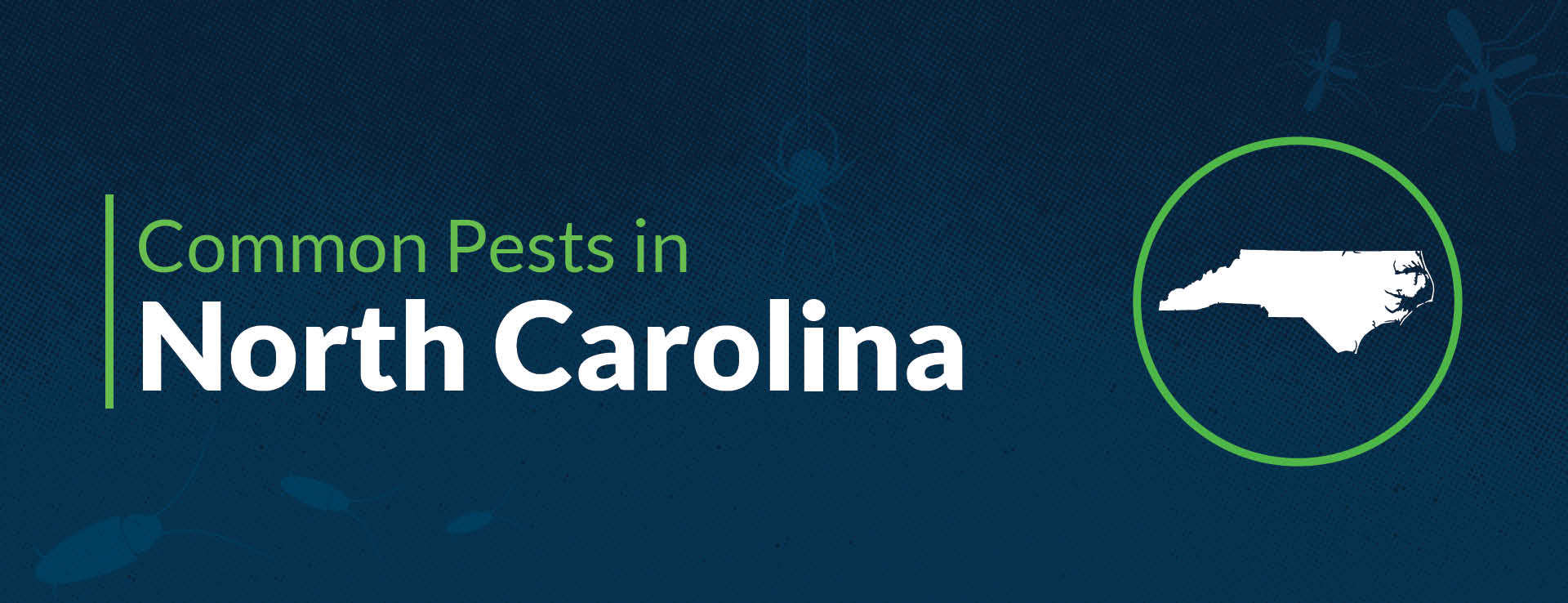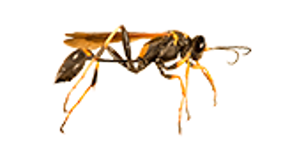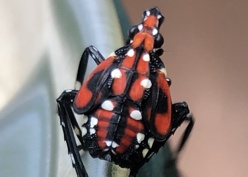
Learn about Pests and Insects in North Carolina
From the Appalachian Mountains to the coast, North Carolina’s nature is a spectacle of beauty—and a breeding ground for unwanted pests and insects. The state’s humid, subtropical climate provides many pests with the moisture they need to live and thrive.
North Carolinians can educate themselves about common insects in their region to help protect their health and homes against potential infestations. Read on to learn more about insects commonly found in North Carolina, helpful prevention tips and when you should contact a licensed pest control professional for assistance.
List of Common Pests and Insects in North Carolina Found Outside the Home
As a North Carolina resident, you may have unwanted run-ins with these pests:
Ants

Like most of the United States, North Carolina is bustling with ant activity from carpenter ants and odorous house ants to red imported fire ants. Ants are more than just a general nuisance, as Carpenter ants can cause structural damage by excavating wood to nest and red imported fire ants can deliver a painful sting that can be life threatening to those allergic to insect stings.
Ticks

These troublesome arachnids pose a serious health threat to humans and animals alike due to their ability to spread diseases, including Lyme disease, which can cause a bulls-eye rash and flu-like symptoms. Tick species, like blacklegged ticks and American dog ticks, thrive during North Carolina’s warm, humid months. The most common sign of a tick infestation is spotting a tick on your property or body. If you have questions about removal, check out this guide.
Mud Dauber Wasps

Mud daubers are found across North Carolina, where they frequently build nests under porch roofs or in sheds. Depending on the species, the nests may be made of short tubes or longer “organ pipe” shapes. Unlike other stinging insects, mud daubers are not aggressive and rarely sting, even when close to their nests. Homeowners often find old mud dauber nests with holes, which indicate that the wasps have already emerged.
Mosquitoes

Insects of North Carolina thrive within the state's ideal warm and wet climate, which is the perfect breeding ground for mosquitoes, including the culex mosquito (or more commonly known as the Common House Mosquito), tiger mosquito and yellow fever mosquito. Notorious for their irritating bites, these pesky insects are also potential carriers of diseases like West Nile virus, Eastern Equine Encephalitis (EEE) and malaria. North Carolina homeowners are advised to remove stagnant water or frequently dump any water-holding containers on their properties to deter mosquitoes from laying eggs.
Spotted Lanternfly

Although North Carolina has not yet reported widespread infestations, the state remains vulnerable because the spotted lanternfly spreads quickly to neighboring areas. These insects lay 30–50 eggs at a time on hard surfaces and hatch in the spring, making them difficult to control once established. Given North Carolina’s vineyards and agricultural resources, the presence of spotted lanternflies could be highly destructive, underscoring the need for early detection and prevention efforts. Residents who encounter this insect in North Carolina should alert the Department of Agriculture to assist with monitoring.
Common North Carolina Pest and Insects Found Inside the Home
When you find an insect or pest in your home, it’s important to know what you’re dealing with. Read on to learn about insects more commonly found indoors in North Carolina:
Cockroaches
 American and German cockroaches thrive in warm, humid areas. Often, these unwanted pests will enter homes through human belongings or drains. Once inside, they commonly migrate to kitchens, laundry rooms and even bathrooms in search of food and water. Cockroaches have been reported to spread at least 33 kinds of bacteria, including E. coli and Salmonella, as well as parasitic worms and other human pathogens. Cockroaches’ saliva, fecal droppings, and cast skins pose a particular health threat to those with allergies, especially children. This pest is uniquely difficult to eradicate, so homeowners should seek help from a licensed pest control professional to handle potential infestations.
American and German cockroaches thrive in warm, humid areas. Often, these unwanted pests will enter homes through human belongings or drains. Once inside, they commonly migrate to kitchens, laundry rooms and even bathrooms in search of food and water. Cockroaches have been reported to spread at least 33 kinds of bacteria, including E. coli and Salmonella, as well as parasitic worms and other human pathogens. Cockroaches’ saliva, fecal droppings, and cast skins pose a particular health threat to those with allergies, especially children. This pest is uniquely difficult to eradicate, so homeowners should seek help from a licensed pest control professional to handle potential infestations.
Termites

Homeowners, listen up! Some of North Carolina's insects and pests can seriously damage your property. Each year, termites cause an estimated $6.8 billion in property damage. The subterranean termite, a species commonly found throughout the U.S., uses its tough mandibles to eat wood 24 hours a day, seven days a week. Over time, these pests can wreak havoc on homes by critically damaging building structures, and at times, even causing buildings to collapse.
Silverfish
 Silverfish, a common house bug found in North Carolina, is named after their silvery, metallic appearance and fish-like movements, are typically found in moist, humid areas of North Carolina homes like bathrooms, basements and attics. Silverfish are known to infest paper items, like wallpaper, books, and envelopes. They can also feed on glue and clothing, and other food items like flour. These pests tend to hide their presence from humans, so damage inflicted by silverfish may go unnoticed by homeowners.
Silverfish, a common house bug found in North Carolina, is named after their silvery, metallic appearance and fish-like movements, are typically found in moist, humid areas of North Carolina homes like bathrooms, basements and attics. Silverfish are known to infest paper items, like wallpaper, books, and envelopes. They can also feed on glue and clothing, and other food items like flour. These pests tend to hide their presence from humans, so damage inflicted by silverfish may go unnoticed by homeowners.
Spiders

North Carolina’s common pests include a variety of spider species, including long-bodied cellar spiders (commonly called daddy longlegs spiders), and venomous brown recluse and black widow spiders. While cellar spiders may not pose a health threat to households, brown recluse and black widow spiders are known to bite when they feel threatened, which can induce serious nausea, muscle aches, fever, and numbness. If you believe that you have been bitten by either a brown recluse or a black widow, be sure seek medical care and bring the suspected spider with you for a positive identification.
What is North Carolina’s State Insect?
Since 1973, the honeybee has been North Carolina’s insect of choice. These social insects can be found around the world and play an extremely beneficial role in pollination. In the United States, folks are likely to encounter species like the European honeybee and the more aggressive Africanized honeybee.
Bees in a swarm are very docile; however, guard bees can become aggressive and use their barbed stingers to inflict temporary local pain when threatened. People can prevent honeybees from nesting around the home by removing access to sugar, food or water products as well as moving flowering vegetation away from high-traffic areas to avoid making honeybees feel threatened.
Find NC Pest Control Professionals Near You
From stinging insects to rodents, it is best to hire licensed pest professionals to assist in the proper identification and treatment of the household pest problem. If you are concerned about pests infesting your household, click below to use a zip code locator to find qualified pest control services in North Carolina.

